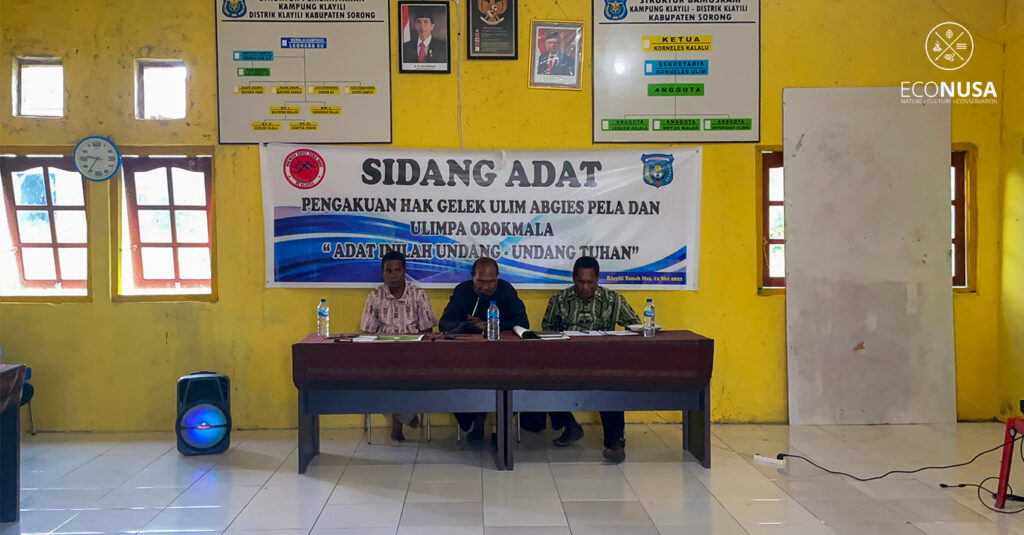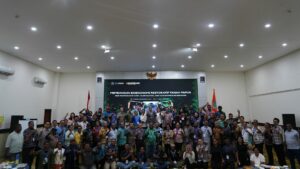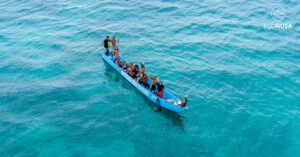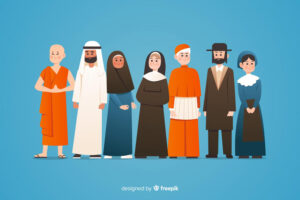
The Moi Tribe Tribal Council held a Tribal Assembly on Recognition of Ulim Abgies pela and Ulimpa Obokmala Clans Rights on Friday 13 May 2022 in Klayili Village. Yohanis Sawisa, the Head of Klayili District, Sorong Regency, West Papua, officially opened the assembly attended by Kwakeik Village Head, Yakob Ulim, Sorong Regent representative, Luther Salamala, and Head of Malamoi Indigenous Community Institution (LMA), Silas O. Kalami.
In front of more than 60 participants attending the tribal assembly, Silas explained that the assembly is deemed customary rules to every land owner to get recognition of property rights, particularly those with direct border. The assembly is the requirement to get land rights recognition from the local government based on the Regional Bylaw No. 10/2017 and Sorong Regency Regulation No. 6/2020. The assembly results will be reported to the Committee on Indigenous People (PMHA) of Sorong Regency which was founded by the Sorong Regency Decree No. 224/KEP. 408/XI/2021 and would be verified prior to designation by the Regent.
Read also: Recognition Process of Customary Land and Indigenous People in West Papua Now Shortened
Customary land occupied by Ulim Abgies Pela and Ulimpa Obokmala Clans is located at Kwakeik Village with direct territorial border of five other Clans, namely Ulim Abgies Kiem, Ulim Abya Pela, Mobalen Klatomok, Kadakolo Awenolo, and Kadakolo Tiliwolo. This was elaborated by Pilemon Ulimpa, a member of Greater Kwakeik Village Students Association (IPMKKR). “For the reason, IPMKKR ensures the existence of five clans with territorial borders adjacent to Ulim Abgies Pela and Ulimpa Obokmala Clans,” said Pilemon.
The event here was the second tribal assembly in Moi Tribe. Previously, the first assembly was held in 2021 to provide recognition to Gilik and Malak Malawilis Pasa Clans. Today event was special because the recognition would be given to two clans at the same customary area.
The assembly was led by three so-called nedinbulu (tribal judge) from the Moi Tribe Tribal Council in Klayili who should moderate the session. Those three judges were Yunus A. Samolo, Ismail Sapisa, and Leonard Su.
Read also: Public and Youth Hope for Governor Regulation on Indigenous People Recognition in West Papua
On the first session, nedinbulu gave chances to Ulim Abgies Pela and Ulimpa Obokmala Clans to testify the shared customary area. Second session, the judge summoned the verification of the customary territorial borders to five clans with shared boders, namely Ulim Abgies Kiem, Mobalen Klatomok, Ulim Abya Pela, Kadakolo Awenolo and Kadakolo Tiliwolo.
Having heard the verification of all parties, the nedinbulu announced two crucial decrees. First, the Ulim Abgies Pela and Ulimpa Obokmala Clans have recognized each other on the customary rights in Kwakeik Village expanding on 955.26 hectare plots of land. Ulim Abgies Pela Clan is declared to be the absolute rights holder (eges pebemun) or the first party and Ulimpa Obokmala has the rights for food or the second party. The second decision was that five clans, Ulim Abgies Kiem, Ulim Abya Pela, Kadakolo Awenolo, Kadakolo Tiliwolo, and Mobalen Klatomok, with shared territorial borders have acknowledged the agreed customary borders.
Kwakeik Village Head, Yakob Ulim, gave serious support to the governance of customary areas in Kwakeik. The governance strengthens the local development based on the customary areas. “This is big job. The elders lead the way for us, the next generation,” said Yakob.
Read also: Following Palm Oil License Revocation in West Papua, What’s Next?
Meanwhile, Klayili District Head, Yohanis Sawisa, expressed his gratitude for the accomplished tribal assembly. “Today I feel something remarkable. I have never had such an experience,” said Yohanis.
Yohanis in particular appreciated Ulimpa Obokmala Clan for being an example in performing the mandate to care for the other clan’s territorial up to now. “What has been done by Mr. Ulimpa has now become a model and barometer to other clans to do the same. Never claim other’s rights,” Yohanis asserted.
Responding to the assembly, Anggiana Ginanjar Adinugraha, EcoNusa staff responsible for the customary land mapping, said that EcoNusa keeps its commitment to backup all indigenous community elements of Moi Tribe, both clan and customary institutions. In Klayiliy District, EcoNusa has supported five clans in Kwakeik Village, namely Ulim Abgies Pela, Ulimpa Obokmala, Ulim Abya Pela, Kadakolo Awnolo, and Mobalen Klatomok. “EcoNusa is open and always tries to facilitate the clans that have been prepared for local mapping for its recognition proposal to the Sorong Regent,” he said.
Baca juga: Expert Witness: License Revocable Due To Noncompliance
As the Malamoi LMA chief, Silas called for the next tribal assembly for three clans rights recognition in Kwakeik that have accomplished their mapping. Those three are Ulim Abya Pela, Kadakolo Awenolo, and Mobalen Klatomok. “The clans that have not done any mapping should prepare themselves and could ask for help to the networks that have so far supported the indigenous people including EcoNusa,” said Silas.
Silas also asked Ulim Abgies Pela and Ulimpa Obokmala Clans to attend the verification done by Sorong Regency’s Indigenous People Committee. The Malamoi LMA as part of the committee will supervise the process at the regency level.
“When clan has strong will, there is no difficult process to get recognition. All will run well as long as there is respect and appreciation. That is important,” Silas added.
Read also: Two Palm Oil Companies Prosecuting South Sorong Regent Never Having Activities
Recognition of customary areas is not simply considered as the legal aspect in the form of government’s Decree. “Above all, the more substantial is the conflict resolution. The customary territorial borders are not separators but rather symbol of unity. Give peace as the legacy instead of hostility to the next generation,” said Anggiana.
Editor: Leo Wahyudi




